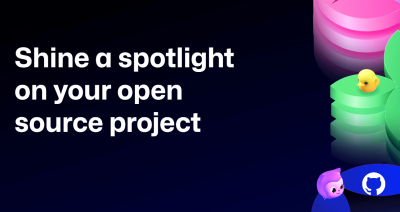Lee Reilly
Senior Program Manager, GitHub Developer Relations. Open source hype man, AI whisperer, hackathon and game jam wrangler. I write && manage programs, support dev communities, and occasionally ship something weird just for the vibes.
Game Bytes is our monthly series taking a peek at the world of gamedev on GitHub—featuring game engine updates, game jam details, open source games, mods, maps, and more. Game on!

Game Bytes is our monthly series taking a peek at the world of gamedev on GitHub—featuring game engine updates, game jam details, open source games, mods, maps, and more. Game on!
Roboden is an inventive, real-time strategy game where you lead robotic colonies in conflict with enemy drones. The game plays with the RTS format in a couple of ways. First, factions are asymmetric: enemy units are not equivalent to your own. And in Roboden you don’t directly control your units; instead, you set priorities for your fleet of autonomous drones.
The latest release introduces a new Inferno environment with new threats, like geysers, lava, and depleted resources, but with rich new rewards. See if you’re ready to face the Inferno and check out the latest Roboden release announcement on Steam.
It’s not often we get to cover a quadruple A game, so when we learned of Aaaaxy, we knew we had to share it. Aaaaxy is a non-linear, 2D puzzle platformer that is fiendishly hard to explain. The game uses traditional platformer mechanics in a decidedly non-traditional game world: a non-Euclidean space where the shortest path between two points is not always a straight line.
The game is created with a number of free and open source tools:
The Acorn Electron recently celebrated its 40th birthday: the home computer released in 1983 was the mass-market successor to the influential BBC Micro computer. If you’ve ever wondered what games development was like in that era, then look no further than the source for Crazee Rider, a motorcycle racing game published in 1987. @KevEdwards wrote the game in 6502 assembly—where much like the racetrack, there were no guardrails.
Beyond All Reason (previously on Game Bytes), the real-time strategy game featuring massive battles of innumerable units, has updated the Scavengers game mode. The gameplay mode puts players in a struggle to survive against new enemy spawning mechanics, a new final boss, and variant units. The release announcement describes not just the new gameplay, but also the hard work that went into the game mode’s development.
The screenshot above shows @deepnight’s game Tenjutsu—featured last Halloween on the GitHub Blog—as a game created in just 48 hours for Ludum Dare 51—being edited in LDTK.
LDTK (the “Level Designer Toolkit”) is a 2D level editor from the creator of Dead Cells and Nuclear Blaze, @deepnight. The latest release includes UI improvements, better handling of loading and saving in the background, and bug fixes. As an editor, a level format, and a Haxe library for loading levels, it’s a compelling tool to consider using to build your games. Learn more about LDTK’s latest updates in the release notes on GitHub.
In other level-editor news, Tiled—a flexible 2D level editor, suited to everything from top-down RPGs to fast-paced side-scrollers—has also shipped a new release. The latest version adds support for setting custom project properties, adds several new scripting features, and fixes bugs. Another worthy entrant to your level-design toolbox. Read the v1.10.2 release announcement for all the details.
FamiStudio is a tool for composing music for the Nintendo NES (also known as the Famicom). Intended for chiptune musicians and homebrew NES developers, FamiStudio makes composing those bleeps and bloops a breeze. The latest release includes some bug fixes and localization updates, but we most wanted to take this as an excuse to mention that we adore chiptunes.
Did you know? Our Game Off videos use music played on Nintendo hardware? It’s true! Listen to “Spectra” by Chipzel—played on a Nintendo Game Boy—check it out on our Game Off 2020 Sizzle Reel ♩ ♪ ♫ ♬
VRF is a library and application for modders and the generally curious to inspect files from Valve’s Source 2 engine games, to take a peek at assets like animations, meshes, textures, and more. It’s an impressive project that reverse-engineered many of Valve’s proprietary file formats. The latest release jumps from v0.4.0 to v5.0 with improved rendering quality, vmap decompilation, and GUI improvements. Open the VRF release notes to learn more about the latest developments.
Another Valve-adjacent project got our attention this month, the August update to Alien Swarm: Reactive Drop, an open-source mod to Valve’s source-available game Alien Swarm. The mod builds upon Valve’s Source engine demo with more maps, alien enemies, and game modes. The latest release improves various missions and begins work on an in-game reporting system. Read the Reactive Drop release announcement to learn more.
A game jam is a creative and time-limited event where game developers, often working in small teams, come together to design, develop, and complete a video game within a set timeframe, typically 48 hours to a week, often centered around a specific theme or challenge.
Test your skills or learn something new with one of these upcoming game jams:
Fresh out of the recent JS13K competition, this endless runner arcade action platformer-type game called Knight Dreams caught my eye and attention. Guide your 13th century knight to collect gems, kill baddies, and scroll (stroll?) your way to victory.
Perhaps it needs no introduction, but Unreal Engine is used in many games and is increasingly finding use in other industries, like film and television and recently released version 5.3. Although Unreal Engine isn’t open source, Unreal Engine subscribers have access to the source via GitHub where Epic accepts customer contributions. Check out the release notes, which highlights the many GitHub contributors who added to the release.
TIC-80 is an open-source fantasy game console, a highly constrained environment for making “retro” games with a restricted color palette, small sprites, and limited sound. TIC-80 recently had its first releases of 2023, so we thought we’d take a moment to highlight a couple of gems for the TIC-80, such as Nibiruman:2080 (source), an addictive arcade shoot ’em up and Dangerous Dave (source), a remake of John Romero’s Mario-inspired 1988 platformer. The TIC-80’s perfect for game jams and for testing ideas before getting into less constrained environments. Consider taking it for a spin in your next game jam (see bottom of post for a list of upcoming opportunities).
Interested to learn more about Fantasy Consoles? Explore the GitHub Collection.
That’s all for this edition of Game Bytes. We’ll see you next month!
Working on something cool or releasing something this month? Share it with us via gamebytes@github.com.

The open source Git project just released Git 2.50. Here is GitHub’s look at some of the most interesting features and changes introduced since last time.

Get insights on the latest trends from GitHub experts while catching up on these exciting new projects.

Celebrate #MaintainerMonth with two big opportunities to showcase your open source project at GitHub Universe and WeAreDevelopers World Congress. Applications are open. Don’t miss out!